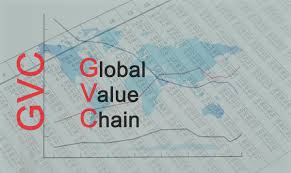Training course on Global Value Chains and Development: Opportunities and Challenges for Developing Countries
Training Course on Global Value Chains and Development: Opportunities and Challenges for Developing Countries will provide participants with the necessary insights and tools to navigate the complexities of GVCs, enabling them to capitalize on emerging opportunities while mitigating potential risks.

Course Overview
Training Course on Global Value Chains and Development: Opportunities and Challenges for Developing Countries
Global value chains (GVCs) have become pivotal in shaping the economic landscape of developing countries. By integrating into these networks, nations can unlock significant opportunities for growth, innovation, and job creation. GVCs enable developing countries to specialize in specific segments of production, allowing them to leverage their comparative advantages. This integration not only enhances export potential but also facilitates technology transfer and skill development, fostering overall economic advancement. However, the engagement in GVCs also presents challenges, such as dependency on foreign markets and vulnerability to global economic fluctuations. Understanding these dynamics is crucial for policymakers and business leaders aiming to maximize the benefits of GVC participation.
Addressing the challenges associated with GVCs requires a strategic approach that encompasses regulatory reforms, investment in infrastructure, and the development of human capital. By fostering an environment conducive to trade and investment, developing countries can better position themselves within global networks. Training Course on Global Value Chains and Development: Opportunities and Challenges for Developing Countries will provide participants with the necessary insights and tools to navigate the complexities of GVCs, enabling them to capitalize on emerging opportunities while mitigating potential risks.
Course Objectives
- Understand the structure and dynamics of global value chains.
- Analyze the role of GVCs in economic development.
- Identify opportunities for integrating into GVCs.
- Evaluate the challenges faced by developing countries in GVC participation.
- Master strategies for enhancing competitiveness in global markets.
- Explore the impact of trade policies on GVC integration.
- Assess the importance of technology and innovation in GVCs.
- Develop skills for managing risks associated with GVCs.
- Communicate effectively with stakeholders in the global market.
- Utilize data-driven approaches to analyze GVC performance.
- Identify future trends in global trade and value chains.
- Foster ethical practices and sustainability within GVCs.
- Prepare for the implications of geopolitical changes on GVCs.
Target Audience
- Trade and investment officials
- Business leaders and entrepreneurs
- Policymakers
- Economists and researchers
- Graduate students in international trade
- NGO representatives
- Supply chain managers
- Development practitioners
Course Duration: 5 Days
Course Modules
Module 1: Introduction to Global Value Chains
- Overview of GVC concepts and terminology.
- Historical evolution of global trade.
- Importance of GVCs in the modern economy.
- Case studies of successful GVC participation.
- Key players and stakeholders in GVCs.
Module 2: Economic Impacts of GVCs
- Analyzing GVC contributions to GDP growth.
- Understanding employment generation through GVCs.
- Impact on local industries and innovation.
- Measuring economic benefits of GVC integration.
- Case studies highlighting economic transformations.
Module 3: Opportunities for Developing Countries
- Identifying sectors with high GVC potential.
- Strategies for attracting foreign investment.
- Leveraging comparative advantages in production.
- Enhancing export capabilities through GVCs.
- Building partnerships with global firms.
Module 4: Challenges of GVC Participation
- Understanding market dependencies and risks.
- Addressing regulatory and institutional barriers.
- Navigating competitive pressures in global markets.
- Managing supply chain disruptions.
- Learning from case studies of challenges faced.
Module 5: Trade Policies and GVCs
- Overview of international trade agreements.
- Analyzing the impact of tariffs and quotas.
- Role of trade facilitation in GVC participation.
- Evaluating the effects of protectionism.
- Case studies of policy impacts on GVCs.
Module 6: Technology and Innovation in GVCs
- The role of technology in enhancing productivity.
- Innovations in manufacturing and logistics.
- Digitalization and its impact on GVCs.
- Assessing technology transfer mechanisms.
- Case studies showcasing successful innovations.
Module 7: Risk Management in GVCs
- Identifying risks in global supply chains.
- Strategies for mitigating disruptions.
- Building resilience in supply chain networks.
- Tools for risk assessment and management.
- Case studies on effective risk management.
Module 8: Sustainability and Ethics in GVCs
- Understanding the importance of sustainable practices.
- Assessing environmental impacts of GVCs.
- Promoting ethical labor practices.
- Implementing corporate social responsibility (CSR).
- Case studies on sustainability in global trade.
Training Methodology
- Interactive Workshops: Facilitated discussions, group exercises, and problem-solving activities.
- Case Studies: Real-world examples to illustrate successful community-based surveillance practices.
- Role-Playing and Simulations: Practice engaging communities in surveillance activities.
- Expert Presentations: Insights from experienced public health professionals and community leaders.
- Group Projects: Collaborative development of community surveillance plans.
- Action Planning: Development of personalized action plans for implementing community-based surveillance.
- Digital Tools and Resources: Utilization of online platforms for collaboration and learning.
- Peer-to-Peer Learning: Sharing experiences and insights on community engagement.
- Post-Training Support: Access to online forums, mentorship, and continued learning resources
Register as a group from 3 participants for a Discount
Send us an email: info@datastatresearch.org or call +254724527104
Certification
Upon successful completion of this training, participants will be issued with a globally recognized certificate.
Tailor-Made Course
We also offer tailor-made courses based on your needs.
Key Notes
- Participants must be conversant in English.
- Upon completion of training, participants will receive an Authorized Training Certificate.
- The course duration is flexible and can be modified to fit any number of days.
- Course fee includes facilitation, training materials, 2 coffee breaks, buffet lunch, and a Certificate upon successful completion.
- One-year post-training support, consultation, and coaching provided after the course.
- Payment should be made at least a week before the training commencement to DATASTAT CONSULTANCY LTD account, as indicated in the invoice, to enable better preparation.